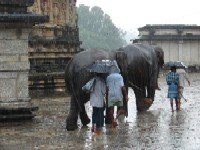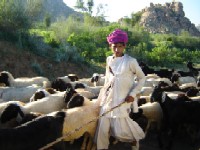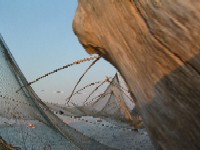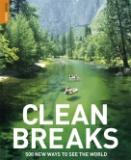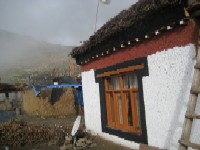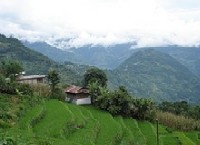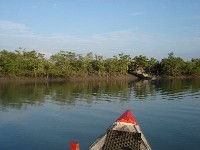If not taken care of immediately, such newly opened destinations will turn into eco-disasters
Ill-planned, half-baked and funding dependent tourism projects can turn disastrous than achieve sustainable tourism. Yesterday afternoon our team went to scout for new tracks and ended up at the valley of Western Ghats in North Kerala. We entered a pristine length of the forest only to be welcomed by plastics strewn all around. 'Ever since we opened up this region for tourism, we see far too much waste that we don't know what to do. They haven't even appointed anyone on a salary to support the 'eco-tourism' initiatives. Worse, when we appointed two women to collect waste, the committee in-charge of the eco-tourism refused to pay wages to them as they thought it was waste of money!'. One of the locals lamented.
On our way back, after a relaxing swim in the stunningly beautiful river in the rain forest, three of us started collecting plastic wastes left behind by tourists, only to realise that our guide who was walking oblivion of the waste surrounding us started picking up one after the another. We didn't train him, we didn't request him, we didn't preach nature conservation. However, on seeing us collecting the plastic waste, he also joined us.
Seeing us collecting the picnic waste left behind by tourists, Matthai our guide joined us
We collected one large bag full of plastic wraps on our way back. Not knowing what to do with it, we took it along with us to the near by town and handed it over to the garbage collector the next day morning! What else do we do? What do we do with plastics? What will the garbage collector from Municipality do? They will burn it. By collecting it from forests, we can ensure that its' not eaten by animals or doesn't damage the immediate surrounding. However by not having a system of waste management, we are just doing a cosmetic cleaning, and nothing else.
Forest department in Kerala has done fantastic work in using tourism as a tool for conservation in places like Periyar, Chimmony and Chinnar regions. To develop sustainable tourism, the capacities of the local hosts including the tribes and those living on the fringes of the forests have to be developed. Thorough briefing on handling of the waste, importance of preserving forest land itself can bring about a change in tourist mind-set. The lack of infrastructure for waste management can to a large extend be minimised by proper behaviour. Quoting Mathai, our local guide, "Well, people tend to do same things as they do back where they live, look at our cities and villages, we throw things everywhere. They continue to do the same here as well".
When a new tourism initiative doesn't take care of basic infrastructure and capacity building of local hosts, why launch it in the first instance. Why name it as eco-tourism and green wash? If our guide Mathai was inspired to collect waste from the tracks, we believe there will be many such Mathai's around the world. Crying about the waste-strewn surroundings doesn't help; be the change! Though engaging Government and tourism industry is important, let us not waste our time thinking they will bring the change and find solutions.
Let us show that we can make the difference, like the way Mathai did.
Labels: eco tourism india, Kerala, Responsible Tourism, waste management
Gandhian Krishnettan - 'I have a duty to be the change'
This morning we had gone to meet some wonderful people with whom we have decided to work together on our sustainable development initiatives in Kerala. By end of the evening we realised that all we did was to learn, to be inspired by what they were doing. It was a day that made all of us smile, because it was another day where we felt good that we didn't give up half-way when things were tough.
We spent the day with Gandhian Krishnettan, who has dedicated his whole life living and promoting Gandhian values. Though his face was familiar in newspapers, I was really surprised to see him walking around the village in a loin around his waist!
Binzy - the student leader is a 'health minister' in the school parliament
Later in the evening, by the river banks, he told us how disappointed he is about the way India is, 60 years after independence. He sounded like a man in hurry,who believes he has a duty to be 'the change', the man to bring changes to the society. He sounded desperate though he wouldn't admit it.
Krishnettan has finally decided to focus on a small village near Calicut,where he visits 50 house-holds every day to engage them on hygiene, health, education and nature conservation. He works with about 37 young students, who go around these houses twice a week with him to talk about the need for waste management, to avoid plastics etc. These students also have planted several trees within the small land holdings their parents have, and they were so proud to show us around! We were more surprised to see them growing a special variety of rice (njavara) known for its medicinal quality in small piece of land in the hillock.
on the right side of the kids are the saplings taken care of by individual house-holds for planting
What was more surprising to us was the trigger that prompted the Gandhian to focus on these 50 house-hold rather than attempting to change the whole world. The septuagenarian said that he had lost his conviction to change the society and had almost given up till he met Rajesh, a young boy who had come to meet him last year after reading about his attempts to make villages self-relliant and sustainable. Rajesh stressed the need for him to work with young students, than trying to change the whole world. This was an effective scaling down from global views to local views, which looked very effective.
Rajesh(L), the youngster who convinced the Gandian to work with the students.
The success of the student initiative was visible when one of the women from the village told us that they don't burn plastic waste anymore. She said with pride that it were"these kids" who told them to segregate waste at source and keep plastic separate. She lamented, "We don't know what to do with plastic though!". The girl who is responsible for the student group is just 14! (Binzy said that she is also "Health Minister" in the school parliament.).
The day couldn't have been any better. Meeting three gems in a day! Gandian Krishnettan who works in the grass-roots especially with the youth, Rajesh who inspired the Septuagenarian, and Binzy the student leader who inspires rest of the team! They will soon be attending an inter-region exchange we are planning to bring together various stake holders of The Blue Yonder to share their experiences in finding solutions to commonly seen issues related to water, waste, power and health.
Labels: Kerala, Responsible Tourism, Sustainable Development
"When responsibility comes from within, whether someone is certified or not doesn't make a difference. However unfortunately that's not how majority of the industry functions. To what extend can reporting back from travellers bring in a control on green-washers? To what extend can tourist actually see the entire supply chain and report back? To what extend would a traveller run around and report back on the green credentials of operators / properties, rather than enjoying their holidays?...
In 5 years of running our company, we have come across many DMC's in India who are many times transparent and accountable than any that has been certified by someone like Green Globe. To do a fantastic job, they don't need certification, however this doesn't mean that any one of these people might be unwilling to respond to questions from those who are interested in the responsibility factor of their business.
We know personally many stories of poorest of poor artisans in the state of Rajasthan who are cheated by so-called fair trade organisations funded by many international organisations. It's not about taking massive amount of margins. (A leather bag bought at 7 Euro sold at 110 Euro in Habitat isn't our concern.)But, to pay these poor artisans, below standard rates to mass produce these bags and then call it fair-trade is the crime. When we ask the illiterate artisan(sitting in front of a big poster announcing the fair-trade practices of his partners (meaning organised buyers in Europe and their whole sale agents in India))what he understands by "fair trade", he says, he gets about 20 GBP per year to send his kids to school ! For me, that is scandal and not fair trade!
When you see a stamp of fair-trade on a product that one purchases in the west, people buy those (to an extend) as a guilt free experience. 'My purchase is making a difference to the destination from where this product came from. I know that this product I buy hasn't been sourced through exploitation'. Oxfam fair trade coffee became a hit earlier mainly because of this. However, as in the case of a traveller, who might want to know more of about the responsibility factor of the supply chain on which the holiday is running, the lay customer who quickly runs into a fair-trade shop doesn't have or resources or energy to investigate the 'fairness' of these products.
I am not suggesting that we need to have another organisation that certify the 'fairness' of the organisation that has already certified these products. Though that will be a hilarious situation.
What is missing in all the certification process is the matter of 'Trust'. Our guests purchase many souvenirs from the artisans we work with mainly in Kerala and Rajasthan. They buy leather products, bell metal art, pottery and puppets without any question of 'certification'. None of these are certified products in any case!
The reason they purchase these with genuine interest is because of the 'trust' they have developed with the company they are travelling with, and most importantly because they are purchasing it straight from the hand of the artisan without a middle-man. ( certified or not!).
I don't know how this 'trust' factor can be built in the purchase when you buy it from elsewhere. (For.eg, a purchase in a shop in London claiming to have fair practices)
However one way to sort out of these issue of trust / certification is for the operators ( Tour, or property owners) to be pro-active about their claims. Orchid Ecotel in Mumbai for e.g, are so proud to show their guests on check-in about the responsibility in which they are running their business! This touch and feel experiences makes all the difference.
Labels: Certification, Fair trade, Kerala, Rajasthan, Responsible holidays
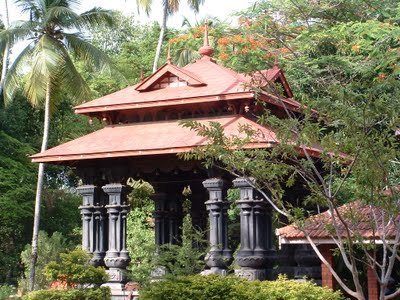
The 'Mandapam' in Thunjan Parambu where the author was initiated into learning in 1976
'Vidyarambham' is a secular South Indian tradition of initiating children into the world of knowledge by wiring letters on sand or rice grain. Yesterday, more than four thousand toddlers were initiated into learning as part of the Navarathiri festival at Thunjan Parambu near Tirur, in Malappuram district in Kerala. Thunjan Parambu is a memorial of medieval poet Thunchath Ezhuthachan, revered as father of Malayalam literature, where children are brought to write their initial letters on sand and rice grains.
Writer C Radkahrishnan says, "It was in Thunjan Parambu that Ezhuthachan modified the Malayalam alphabets and wrote the Harinamakeerthanam to popularize them. Even after centuries people from various parts of the state come to take sand from Thunjan Parambu to initiate their children to the alphabet."
It was in Thunjan Parambu that Ezhuthachan taught and spent better half of his life. Here one can find the original stylus which Ezhuthachan wrote the Malayalam Ramayana, a Hindu epic. Legend says that the whole Ramayana in Malayalam was recited to the author by a parrot so that he could compose tirelessly without having to stop in between.
The literature park designed according to traditional Kerala architecture, has a beautiful bronze statue of the parrot and larger version of the Iron stylus and the palm leave in with which he wrote the epic. The legend says that the Nux Vomica tree with bitter leaves here has lost their bitter taste to sweet wisdom.
Thousands of children were initiated into the world of letters on Monday at public functions organised by religious/educational institutions, charitable organisations, cultural and media establishments across the state as part of the Vidyarambham ritual marking the conclusion of the Navaratri festival. More news here
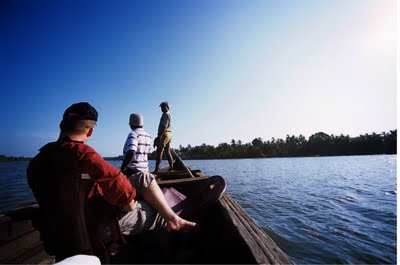
a peaceful journey through Tirur river
Most of the trips that The Blue Yonder organises along the River Nila is initiated by a visit to Thunjan Parmbu followed by a serene country boat ride through the Tirur River that joins Nila before pouring into the Arabian sea at the estuary in Ponnani. Check out for more details here.
Labels: Kerala, Literature, Responsible Tourism India, River Nila, Thunjan Parambu
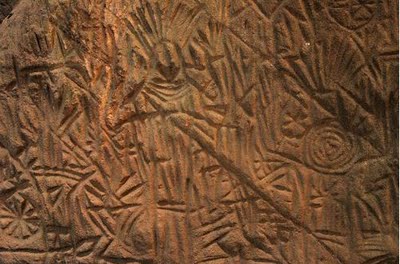
engravings at the edakkal caves
According to The Hindu newspaper of 26th Sept 2009, "A rock engraving, indicating clear remnants of Harappan culture, has been found in the Edakkal caves in neighbouring Wayanad district, linking the Indus Valley civilisation with South India.
“There had been indications of remnants akin to the Indus Valley civilisation in Karnataka and Tamil Nadu, but these new findings give credence to the fact that the Harappan civilisation had its presence in the region too and could trace the history of Kerala even beyond the Iron Age,” historian M R Raghava Varier said. "
Even before the latest findings, Edakkal Caves have attracted serious travellers for its pre-historic etchings and engravings. Brought to the attention of the world by an English officer Fred-Fawcett, the site was identified to be a habitat of Neolithic people (i.e. late Stone Age, c4000BC to c1700BC).
Except for the hue and cry that we hear when similar archeological findings are publicised, there is hardly any care being taken to maintain the sanctity of the site. If not for the interest shown by passionate individuals and responsible hoteliers nearby, the site would have been in doll drums long time back. Wayanad Tourism Organisation and some of the well-known archeologists in Kerala has been trying since 2007 to get the attention of UNESCO to declare the area amongst the World Heritage sites.
More information on similar sites are recorded in this website.
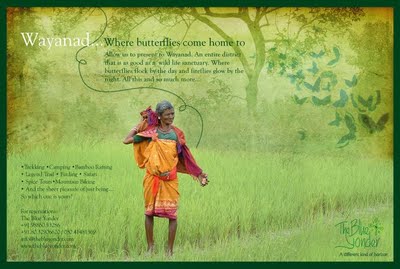
Wayanad: Where butterflies come home to. First advertisement on Wayanad from TBY
Rich in wildlife, Wayanad's mountainous terrain houses the best in wildlife and spreads the aroma of all possible spices found in Kerala. Situated in the southern region of the Deccan plateau bordering Karnataka state, this district is untouched by rail or air traffic and is approachable only by road.
The Blue Yonder organises responsible holidays in Wayanad which includes heritage and legend trails, rain forest trekking, bamboo rafting, spice tours, wildlife safari and walking tours. More information on our Malabar holidays can be found here.
Labels: Archeology, Edakkal Caves, Kerala, Neolithic sites, Responsible Tourism India, Wayanad
sapling planted last year post monsoon.
The idea is to ensure that we don't just plant some saplings here and there, but replicate miniature sacred groves that were so plenty in our area even couple of decades back.
Dr M. S Swaminathan once said of Sacred Groves "Unlike, a botanical garden where a wide range of trees and plants are collected and cultivated for the purpose of education and enjoyment, the sacred groves are one method of expressing the gratitude of human families to the trees which sustain and support life under a given agro-ecological condition."
volunteers from Vayali on their way to traveller's forest
Trustees of "punjarjeevani' who are implementing partners of The Blue Yonder and Nila Foundation
Of the 120 saplings we planted, many of them were special as we planted it on behalf of many people we knew. Listing some of them here.
** May I have a "I love my son" tree?
** Could you please plant a tree for our wedding date
** For my family
** One for the spirits of the past, present and future?)
** For a life that is full of adventures
** One for the decriminalisation of gay sex in India (which for me is a big step in a democracy),
** Another one for the strife in Iran (whatever, the outcome, it makes me happy to see that people come together to fight for their freedom. It gives me hope)
** A tree for a marriage I witnessed
** A tree just to celebrate life (and lots of thoughts and wishes).
** "THANK YOU for a good life" tree
"if its not too late, could I have one more tree for my Uncle Johnny? He loved them, would never even accept cut flowers until the end of his life - scolding people who "killed plants":) And he always wished to be remembered in this way, actually..."Plant a tree for me!" he used to smile.."And I'll be with you always.." Could you - please? "
Volunteers from Vayali and Pravah at the "traveller's forest"
While we planted for our friends around the world, we had few things to look at. We planted trees for /to
** our team at Vayali who won the Change Loom Awards last week,
** to celebrate the naming ceremony of one of our colleague's son,
** to make up for a bird that one of us killed when he was 7 years old ( yeah, now don't think this is like a carbon-offset program! ;)),
** a plant for our friends and families,
** for an uncle who died,
** for a friend who lost her son in an accident,
** for a colleague who completed an amazing book on rivers in Kerala,
** for our teachers and more than anything
** for a river that we have pledged to bring back life into it.
** for a river that brought many of us together to understand the meaning of life!
Why don't we all start planting trees to celebrate? Why gift useless presents for your friend's wedding, when giving a plant could bring cheer for many generations to come?
More pictures from the planting can be seen here
Labels: Kerala, Nila Foundation, Responsible Tourism, Responsible Travel, River Nila, Sustainability, The Blue Yonder, Travellers Forest, Water
 Important archaeological finding left un-attended
Important archaeological finding left un-attended
0 Comments
Published by GP
on Monday, 22 June 2009
A finding of historical importance left un-cared
Anakkara along River Nila is becoming a site of great importance because of many recent findings. So this morning we decided to go and find more details that that is available online. Idea was to meet the local Panchayat president, meet the owner of the place ( the land belongs to a private school that is constructing massive buildings in the vicinity). With such an important finding, we were expecting proper protection for the area, ensuring that no further damage is done to the location. Instead all we could see was a thin coir rope tied around a radius of about 5 metres. That's it! The following pictures were taken today and the text in quote is from two articles that came out in The Hindu 10 / June / 2009 and 21 / May / 2008
"The archaeological excavation at Anakkara in the district gave evidences of first excavated Iron Age habitation-cum-burial site in Kerala. Carbon dating of charcoal fragments and physical anthropological studies of bones would give more information on the chronology and life pattern of people lived in this area."
"Archaeologists have discovered a pre-historic necropolis (cemetery) with megalithic cairn circles dating back 2,500 years, many post holes that probably point to the ancient practice of excarnation, a 'wood-henge'-like ritual monument and a site of primitive astronomical intelligence at Anakkara, near Kuttippuram in Malappuram district."
River Nila flows in the background of the escavated site.
"Excavations at the site, a laterite plateau atop one of several primary hills overlooking the Ponnani river at Valayangad in Anakkara grama panchayat, have revealed three chamber tombs containing burnished black and red ware, black bowls and some iron objects commonly seen among megalithic grave goods. Archaic features of the burial type and the conspicuous absence of non-local artefacts among the interred objects suggest that the find is around 2,500 years old. Valayangad literally means the burial place with cairn (stone) circles, derived from the ancient necropolis of cairns. "
The three burial rooms refered in the press reports
"Interior of the stone circle is divided into three chambers using granite boulders. In this, two chambers were excavated and in each chamber large burial urns with burial goods like iron implements, bone and pots were noticed. Special features of the burials are the occurrence of a hanging lamp and the burial goods were found kept in the river sand at the bottom of the urn, possibly indicating some sort of rituals associated with riverbanks."
In less than 100 metres away from the 'escavated burial ground, laterite stone cutting is going on un-disturbed. It was in a similar site that workers came across "caves" and gets reported to the Archaeological Survey of India. If this finding was in some other countries, I can't imagine this happening. Reckless Government, reckless people?
Labels: Anakkara, Archeology, History, Kerala, River Nila, The Blue Yonder
 TBY featured twice among '500 new ways to see the world'
TBY featured twice among '500 new ways to see the world'
0 Comments
Published by GP
on Tuesday, 16 June 2009

Cover page: edited by Jeremy Smith and Richard Hammond
Discusses 500 experiences and different ways to travel. This book lets you discover various adventures from sleeping in houseboats in Kerala and witnessing the zebra migration in Botswana to taking the train-hotel from Paris to Madrid. It offers information on the best hotels, resorts, and tours run by people who are passionate about what they do.

Pic: Kerala scenes, Kathakali performance, practicsing Kalaripayattu, peppercones growing in the sun
The following excerpts are from the book
" To really discover the heart of Kerala, you need to leave the beach, jump off the houseboat or troop down from the hills to the banks of the River Nila, where a variety of traditional activities are on offer with The Blue Yonder...."

"The Blue Yonder take guest to see people who make dolls like this"
"The largest state in India, Rajasthan is also one of the most beautiful and exciting - home to colourful markets, welcoming cities, vibrant music and delicious cuisine. The royal palaces that pepper the state feature heavily on tourist itineraries, rich , decorative and intricate, they epitomize the luxury and decadenance of the Raj. But for those who want to go behind the scenes, India-based travel company The Blue Yonder runs custom-made trips that allow you to explore what really makes Rajasthan tick. "
Labels: Foot Print Guide books, Jeremy Smith, Kerala, Media, Rajasthan, Responsible Tourism, Responsible Travel, Richard Hammond, River Nila, The Blue Yonder
 Pre-historic cemetery discovered along River Nila
Pre-historic cemetery discovered along River Nila
0 Comments
Published by GP
on Friday, 12 June 2009

A 'wood-henge'-like ritual monument, discovered at Anakkara, near Kuttippuram in Malappuram district. Photo from The Hindu
Labels: Bharathapuzha, Kerala, Responsible Tourism, Responsible Travel, River Nila

The Blue Yonder holiday experiences in Kerala was featured as a travel program on Sunday the 22nd March 2009 in Austrian Radio. The program was live on ORF site. Please check archives for audio. Some write up from Matthias Haydn is available here as well.
Labels: Austrian Radio, Kerala, Matthias Haydn, Media, Promotion, Responsible Tourism

Bangalore © The Blue Yonder 2008
Labels: Kerala, Media, Musical Trail, Press, Responsible Tourism, River Nila, The Blue Yonder
 "Near the River' series to launch "The Artist's Haven' with Rob Pepper
"Near the River' series to launch "The Artist's Haven' with Rob Pepper
0 Comments
Published by GP
on Thursday, 30 October 2008

near the river logo:
"The Artist’s Haven - 23rd February - 8 March 2008"
- Rob Pepper and Aimie Littler join hands with TBY to draw River Nila:
The Bharatapuzha, also known as the River Nila, is the lifeline of Kerala. In many ways, it nurturued Kerala's culture, literature, science and ethos. Malayalam language itself was born on its banks. Many famous writers, singers, folk and classical artists still live in villages that the river embraces right from Kalpathy in Palakkad to Ponnani in Malappuram district.
Says Jnanpeeth award-winning writer MT Vasudevan Nair: "For me, Nila's significance is greater than that of the greatest ocean in the world. Much of my inner and external life is associated with the river Nila and Koodallur village located on its bank. The Nila and and Koodallur together form the backdrop for many of his novels, short stories and screenplays. In a sense, the Nila has inspired and brightened Kerala's mindscape. Today, the river appears to be choked by the needs and greed of modern civilization and is reduced to a mere trickle. Its tributaries are dammed to oblivion, channels sucked out by commercial interests, cool forests on its catchments butchered to satisfy consumer needs.
Death of the river Nila would mean an insult to a long line of writers, performing artists thinkers and sages who live on its banks and nurture Kerala's spirit, thoughts and dreams - in short, the very identity of Kerala.

Pic: Artist Rob Pepper
'Near the river' is an effort to direct the spot light onto a unique river valley civilization. Into its third year, ’Near the river’ provides an opportunity for art and culture inclined travellers to sketch a river that is often the thread that weaves lives and traditions in an ageless manner.
The Blue Yonder is partnering with London based Artists Rob Pepper & Aimie Littler for a two week art retreat along the river in Kerala. While working with Rob and Aimie, the travellers will get an opportunity to work with local artists as well. The travel with local interpreters will give insights into the uniqueness of the region and the group will be capturing this through drawing. The tour will conclude with a two-day exhibition of the images captured by the travellers in one of the leading art galleries in Cochin and / or Bangalore.
As a traveller this will be a great opportunity to explore the river and its associated culture whilst becoming an integral part of the local culture. Only a group of ten artistically inclined travellers can be taken on this group. The trip starts on the 23rd Feb for two weeks. Part of the proceedings from this trip will go towards supporting Nila Foundation. Contact us for the prices and more details on this amazing opportunity.

About Rob Pepper & Aimie Littler
Rob Pepper & Aimie Littler work out of their art studio in Islington, London. They’ve been working together for thirteen years on many artistic projects from international exhibitions, public art commissions, human rights campaigns to workshops with disadvantaged teenagers.
Rob Pepper is the artist maker and is a member of the Academic Board and a Senior Tutor at London's Art Academy. He creates large scale paintings, intimate drawings and his work has adorned album & book covers. Aimie Littler is the director of the Not For Profit Organisation "The Truth Isn’t Sexy" which works on the prevention of human trafficking. When not running this she conceptually develops the artwork, edits their publications and curates the many international exhibitions they have had over the years.
Together Rob & Aimie co-facilitate the Drawing Room which has a growing following in London. These art workshops focus upon an enjoyment of the artistic process and the nurturing of a happy group. They believe the creative impulse needs to be acknowledged as an important part of ones well being and it is this philosophy that they will be bringing to the new relationship with The Blue Yonder.
© The Blue Yonder 2008
Labels: Aimie Littler, Kerala, River Nila, Rob Pepper, The Blue Yonder
 World Nomads launches Travel Scholarship to Kerala!
World Nomads launches Travel Scholarship to Kerala!
3 Comments
Published by GP
on Tuesday, 7 October 2008


The River Nila offers countless opportunities to witness thrilling folk performances, far beyond the tourist trail. Photo © David Stott
Assignment brief from worldnomads.com :
* We'll fly you to India from your country of residence. You need to be available between February 16th and March 7, 2009 to participate on the Blue Yonder Tour and Footprint travel writing assignment.
*Your Kerala journey with The Blue Yonder will give you unique insight into the River Nila region. With a focus on sustainable tourism, the tour is specifically tailored for the lucky scholarship recipient to inspire your travel writing , and you will be personally escorted by a TBY interpreter.
*The ten day tour will include interactions with musicians, folk artists, bell metal workers, potters, sand miners, fire worshippers and ritualistic healers. You will also be planting saplings at the 'Traveller's Forest' a community driven eco-restoration project.The tour will be based on the age-old tradition of story telling that reveals the uniqueness of the region and the importance of rivers for a sustainable life.
*After touching base with your mentor - David Stott, you will research, review and update essential travel info including accommodation, bars & restaurants, entertainment, shopping, tours, activities and transport, as well as searching out those local secrets that travellers want to read about.
* Your mentor will be at hand to offer guidance, but essentially this is your assignment; you will travel on your own for this part of the journey so you must be comfortable travelling solo. David will assign you a specific local area based on your travelling experience.
* The fruits of your labour will feature in the new edition of the Footprint Inida Handbook, placing your foot firmly in the door of the elusive travel writing industry!

Assignment location:
While Kerala is ranked as a top ten destination in the world, some parts of Kerala still remain unknown and unvisited. The river Nila, the longest river in Kerala (209kms) offers one of the most unique cultural experiences as it has an ancient and steeped in tradition river civilization. Be it the classical Kathakali or ritualistic folk art forms or temple festivals or literary traditions, you can trace a definite and indelible impact of the river Nila in each and every aspect.
The recipient of the Scholarship, along with the best entries will be published on the WorldNomads.com website on January 23, 2009. Applications close midnight January 9, 2009.(AEST): Apply now here:
For any further information, please read this section:
© The Blue Yonder 2008
Labels: Foot Print Guide books, Kerala, Responsible Tourism, Scholarships, The Blue Yonder, Travel Writing, World Nomads

Interview with Sumana Mukherjee. Words like "breathing new life into Kerala's Ganga" makes one think that the River is all live and kicking now. Earlier Travelmole also carried a story with a title "Responsible Tourism averts threat to Kerala's dying river!" Irrespective of the global attention that is now falling on our small river, as a colleague once mentioned, the truth could be that when we started working it was a dying river and now probably its a dead river! But I can certainly agree to the fact that we have managed to bring together like-minded people to think and respond to the status of our river.
München ©GP 2008
Labels: Gopinath Parayil, Kerala, Responsible Tourism, River Nila, The Blue Yonder
